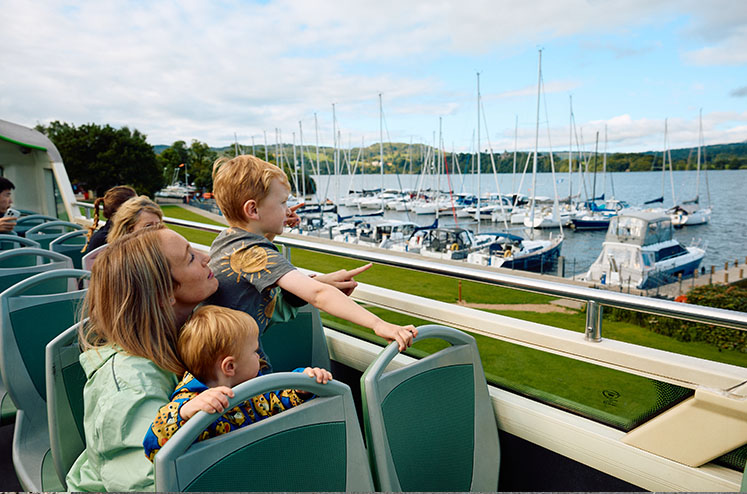
What is it?
Before the Covid-19 pandemic, the vast majority of visitors arrived in the Lake District by private motor vehicle; this has increased further since ‘lockdown’ restrictions have eased. The challenge for the Lake District is to be a place where everyone, regardless of wealth or ability, is able to access the National Park sustainably via different modes of transport. Low carbon travel needs to be the obvious and most attractive choice for essential and leisure travel. The nation’s mental and physical health-benefits from active travel in an inspirational landscape need to be secured.
What we want to achieve is set out in the Partnership Plan here:
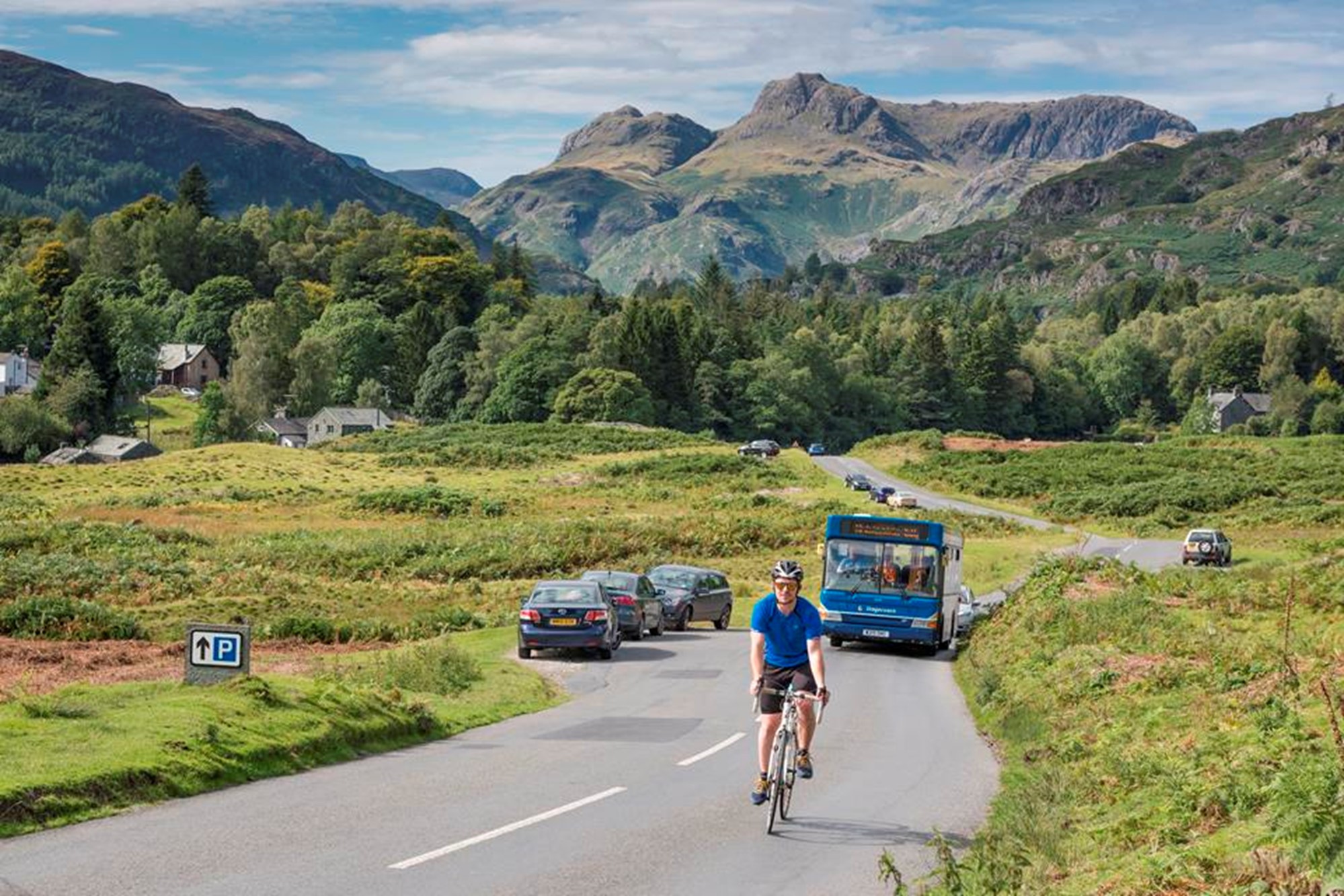
ACTion with Communities in Cumbria (ACT) has overseen research over the last 18 months, on behalf of the Partnership, to explore whether there is an appetite for both visitors and local people to travel differently in the Lake District. The results showed that there is!
Lorrainne Smyth, CEO of ACT, said: ‘This research collected responses from over 3,000 people, both locals and visitors, in face-to-face interviews, focus groups, three large online surveys and two events.
The latest national online survey with 1,000 responses had 81% saying they would be willingly to travel without their car on holiday and 46% concerned about the impact of their travel choices on the environment. In local surveys 61% felt negatively about travel in the National Park and nearly 60% would like to see an integrated, cheaper transport system in the Lake District.
Many respondents also indicated that charging for access to busy places at busy times would fund improvements in services for all. We have a lot of information from the surveys and, along with partners, will be using this to inform planning for the future of transport services in the Lake District’.
This research was funded by The Lake District National Park Authority, Friends of the Lake District, Esmée Fairbairn Foundation and ACT and was commissioned by the Sustainable Transport and Travel Key Outcome Group of the Lake District National Park Partnership.
Lorrainne continued: ’We have heard that people are up for change and that gives us renewed energy and legitimacy to explore the options around different ways to travel in the Lake District’.
More details of the report and its findings can be found in this news article:
Where do you want to go 2024-2025
Source: ACTion with Communities in Cumbria
Two carbon reduction transport projects have progressed in 2023-24. Both of the unitary authorities (Cumberland Council and Westmorland and Furness Council) have run an electric vehicle (EV) charge point programme in their areas.
In addition, Westmorland and Furness Council, in association with Stagecoach, has submitted a bid to the government-funded ZEBRA (Zero Emissions Bus Regional Areas) programme which is designed to help local authorities introduce zero emission buses and the necessary associated infrastructure.
The bid, which is supported by a number of Partners, focusses on the 599 route linking Kendal, Windermere and Grasmere.
Source: Lake District National Park Authority
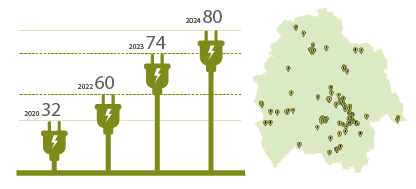
Infographic: Since 2020 the number of charging points in the park has increased from 32 to 80 this year.
Source: Zap-map.com
Cumbria Visitor Survey 2022 captured the percentage of respondents using electric or hybrid cars as their main mode of transport to reach Cumbria and the Lake District and then to travel around once they were here. The next survey will take place in 2025 when it will be interesting to see if there has been an increase in these figures as the Partnership works to improve the sustainable transport offer in the National Park.
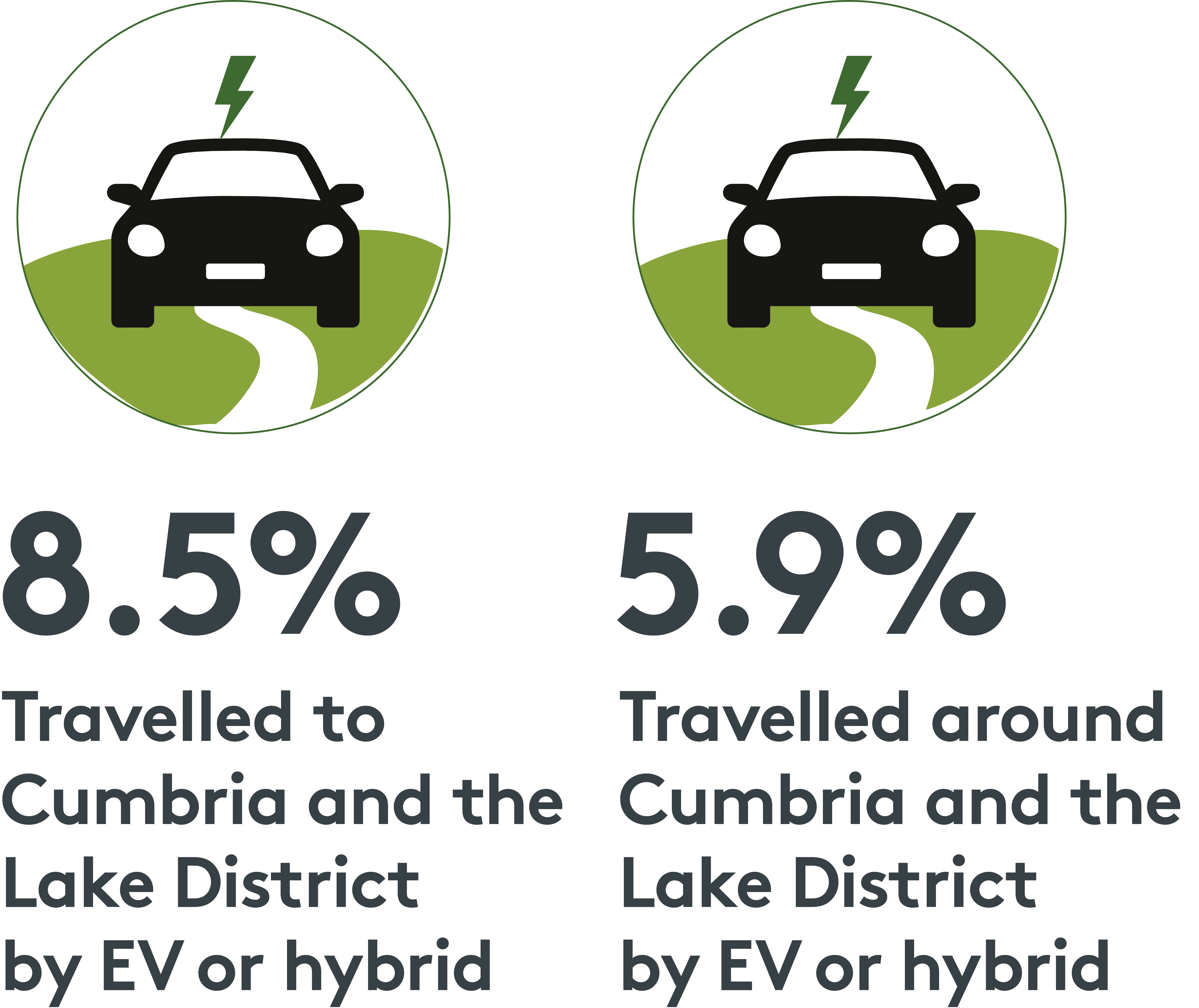
Infographic: 8.5% of visitors travelled here by EV or hybrid vehicle, with 5.9% using them to travel around while they were here.
Source: Cumbria Tourism Visitor Survey 2022
Nationally 2.8% of all licensed vehicles on the roads are fully electric and 18% of new registrations are zero emission. Source:
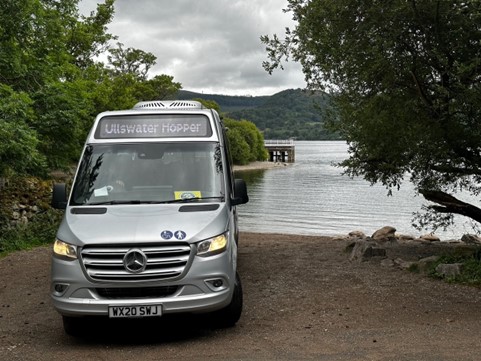
Photo: the Ullswater Hopper, c/o SITU
Sustainable and Integrated Transport for Ullswater (SITU) is run by a group of residents from parishes throughout the Ullswater Valley. The group is proactively developing projects to enable and encourage more visitors to travel sustainably through the valley.
In 2023 the group launched the Ullswater Hopper bus, which ran on weekends and bank holidays from 1 July to 29 October. This connected the main centres of accommodation away from the existing bus route with attractions in the valley. Operated by Stagecoach, the service carried over 1,150 passengers over the 2023 season. The bus was funded through fare income and generously support with grants from from Eden District Council (as it then was, now Westmorland and Furness Council) and the Zero Carbon Cumbria Partnership (Lottery Funding) through Cumbria Action for Sustainability.
In 2024 the season has been extended to run from 23 March to 3 November on weekends and bank holidays, and a new route has been introduced connecting Keswick with Penrith via Matterdale and Ullswater. To the end of June, the service has carried over 4,400 passengers. Some of the previous year’s grant funding has been carried forward, and around 30 local businesses and community organisations have pledged support to cover any shortfall between the fare income and the cost of running the service.
The success of this project is testament to the energy and skills of the local group, and demonstrates the benefits of community-led delivery. The bus service is just one of the sustainable transport initiatives they are delivering or developing. For more details visit www.situcumbria.org.uk
Source: SITU
Cumbria County Council submitted a Strategic Outline Business Case for capacity improvements to the Lakes Line in January 2023 for consideration as part of the Rail Network Enhancements Pipeline process. Since submission there has been ongoing dialogue between the Department for Transport and Westmorland and Furness Council on the business case and a decision is pending.
Source: Lake District National Park Authority
One of the Partnership’s actions is to advocate for and monitor the West Coast Mainline service stopping and capacity improvements. The following data have been extracted from the published timetable. All trains that travel all or part of their journey on the West Coast Mainline and have a scheduled stop at either Oxenholme or Penrith (both gateway stations for the Lake District) are shown:
| Station | North bound Mon-Fri | South bound Mon-Fri | Weekly |
|---|---|---|---|
| Penrith | 32 | 30 | 31 |
| Oxenholme | 40 | 38 | 43 |
| Either or both | 46 | 46 | 44 |
| Station | North bound Saturday | South bound Saturday | North bound Sunday | South bound Sunday | Weekly |
|---|---|---|---|---|---|
| Penrith | 31 | 29 | 28 | 25 | 423 |
| Oxenholme | 43 | 39 | 35 | 32 | 539 |
| Either or both | 44 | 42 | 37 | 37 | 620 |
Monitoring the numbers of services operating, on different days of the week, helps the Partnership to understand whether or not rail services that allow passengers to access the Lake District are increasing, decreasing or stable over time.
Source: published rail timetables for the period December 2023-May 2024